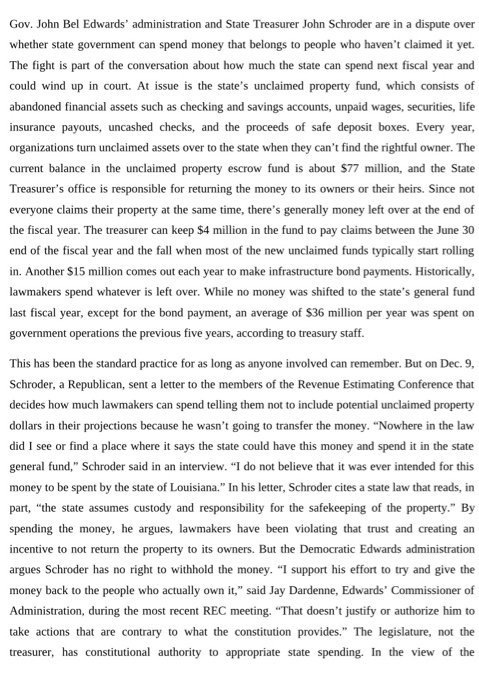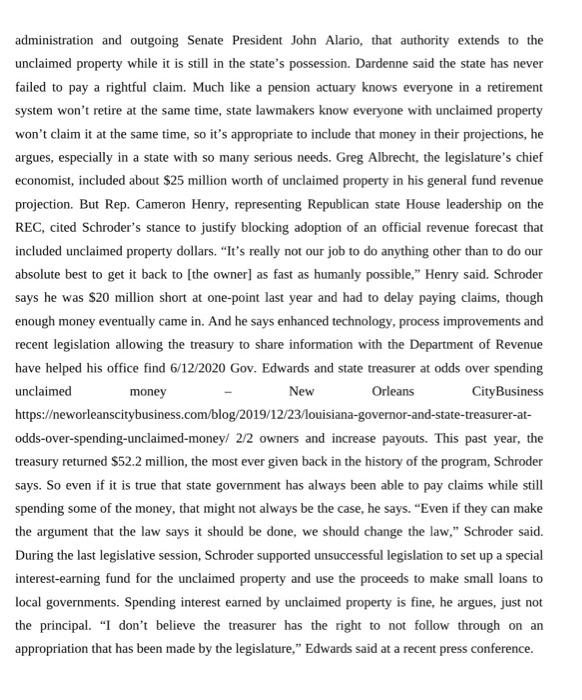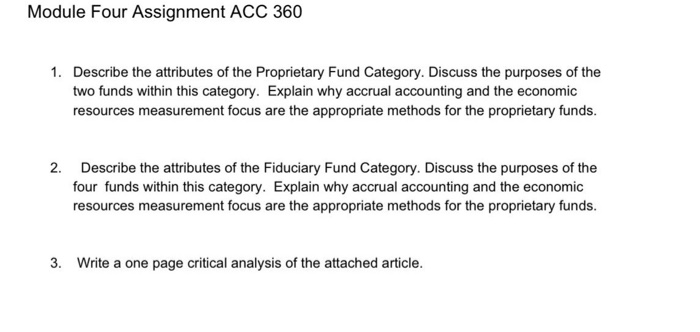Gov. John Bel Edwards' administration and State Treasurer John Schroder are in a dispute over whether state government can spend money that belongs to people who haven't claimed it yet. The fight is part of the conversation about how much the state can spend next fiscal year and could wind up in court. At issue is the state's unclaimed property fund, which consists of abandoned financial assets such as checking and savings accounts, unpaid wages, securities, life insurance payouts, uncashed checks, and the proceeds of safe deposit boxes. Every year, organizations turn unclaimed assets over to the state when they can't find the rightful owner. The current balance in the unclaimed property escrow fund is about $77 million, and the State Treasurer's office is responsible for returning the money to its owners or their heirs. Since not everyone claims their property at the same time, there's generally money left over at the end of the fiscal year. The treasurer can keep $4 million in the fund to pay claims between the June 30 end of the fiscal year and the fall when most of the new unclaimed funds typically start rolling in. Another $15 million comes out each year to make infrastructure bond payments. Historically, lawmakers spend whatever is left over. While no money was shifted to the state's general fund last fiscal year, except for the bond payment, an average of $36 million per year was spent on government operations the previous five years, according to treasury staff. This has been the standard practice for as long as anyone involved can remember. But on Dec. 9, Schroder, a Republican, sent a letter to the members of the Revenue Estimating Conference that decides how much lawmakers can spend telling them not to include potential unclaimed property dollars in their projections because he wasn't going to transfer the money. Nowhere in the law did I see or find a place where it says the state could have this money and spend it in the state general fund," Schroder said in an interview. "I do not believe that it was ever intended for this money to be spent by the state of Louisiana." In his letter, Schroder cites a state law that reads, in part, the state assumes custody and responsibility for the safekeeping of the property." By spending the money, he argues, lawmakers have been violating that trust and creating an incentive to not return the property to its owners. But the Democratic Edwards administration argues Schroder has no right to withhold the money. I support his effort to try and give the money back to the people who actually own it," said Jay Dardenne, Edwards' Commissioner of Administration, during the most recent REC meeting. "That doesn't justify or authorize him to take actions that are contrary to what the constitution provides." The legislature, not the treasurer, has constitutional authority to appropriate state spending. In the view of the administration and outgoing Senate President John Alario, that authority extends to the unclaimed property while it is still in the state's possession. Dardenne said the state has never failed to pay a rightful claim. Much like a pension actuary knows everyone in a retirement system won't retire at the same time, state lawmakers know everyone with unclaimed property won't claim it at the same time, so it's appropriate to include that money in their projections, he argues, especially in a state with so many serious needs. Greg Albrecht, the legislature's chief economist, included about $25 million worth of unclaimed property in his general fund revenue projection. But Rep. Cameron Henry, representing Republican state House leadership on the REC, cited Schroder's stance to justify blocking adoption of an official revenue forecast that included unclaimed property dollars. It's really not our job to do anything other than to do our absolute best to get it back to the owner) as fast as humanly possible," Henry said. Schroder says he was $20 million short at one-point last year and had to delay paying claims, though enough money eventually came in. And he says enhanced technology, process improvements and recent legislation allowing the treasury to share information with the Department of Revenue have helped his office find 6/12/2020 Gov. Edwards and state treasurer at odds over spending unclaimed money New Orleans CityBusiness https:/eworleanscitybusiness.com/blog/2019/12/23/louisiana-governor-and-state-treasurer-at- odds-over-spending-unclaimed-money/ 2/2 owners and increase payouts. This past year, the treasury returned $52.2 million, the most ever given back in the history of the program, Schroder says. So even if it is true that state government has always been able to pay claims while still spending some of the money, that might not always be the case, he says. Even if they can make the argument that the law says it should be done, we should change the law," Schroder said. During the last legislative session, Schroder supported unsuccessful legislation to set up a special interest-earning fund for the unclaimed property and use the proceeds to make small loans to local governments. Spending interest earned by unclaimed property is fine, he argues, just not the principal. I don't believe the treasurer has the right to not follow through on an appropriation that has been made by the legislature, Edwards said at a recent press conference. Module Four Assignment ACC 360 1. Describe the attributes of the Proprietary Fund Category. Discuss the purposes of the two funds within this category. Explain why accrual accounting and the economic resources measurement focus are the appropriate methods for the proprietary funds. 2. Describe the attributes of the Fiduciary Fund Category. Discuss the purposes of the four funds within this category. Explain why accrual accounting and the economic resources measurement focus are the appropriate methods for the proprietary funds. 3. Write a one page critical analysis of the attached article. Gov. John Bel Edwards' administration and State Treasurer John Schroder are in a dispute over whether state government can spend money that belongs to people who haven't claimed it yet. The fight is part of the conversation about how much the state can spend next fiscal year and could wind up in court. At issue is the state's unclaimed property fund, which consists of abandoned financial assets such as checking and savings accounts, unpaid wages, securities, life insurance payouts, uncashed checks, and the proceeds of safe deposit boxes. Every year, organizations turn unclaimed assets over to the state when they can't find the rightful owner. The current balance in the unclaimed property escrow fund is about $77 million, and the State Treasurer's office is responsible for returning the money to its owners or their heirs. Since not everyone claims their property at the same time, there's generally money left over at the end of the fiscal year. The treasurer can keep $4 million in the fund to pay claims between the June 30 end of the fiscal year and the fall when most of the new unclaimed funds typically start rolling in. Another $15 million comes out each year to make infrastructure bond payments. Historically, lawmakers spend whatever is left over. While no money was shifted to the state's general fund last fiscal year, except for the bond payment, an average of $36 million per year was spent on government operations the previous five years, according to treasury staff. This has been the standard practice for as long as anyone involved can remember. But on Dec. 9, Schroder, a Republican, sent a letter to the members of the Revenue Estimating Conference that decides how much lawmakers can spend telling them not to include potential unclaimed property dollars in their projections because he wasn't going to transfer the money. Nowhere in the law did I see or find a place where it says the state could have this money and spend it in the state general fund," Schroder said in an interview. "I do not believe that it was ever intended for this money to be spent by the state of Louisiana." In his letter, Schroder cites a state law that reads, in part, the state assumes custody and responsibility for the safekeeping of the property." By spending the money, he argues, lawmakers have been violating that trust and creating an incentive to not return the property to its owners. But the Democratic Edwards administration argues Schroder has no right to withhold the money. I support his effort to try and give the money back to the people who actually own it," said Jay Dardenne, Edwards' Commissioner of Administration, during the most recent REC meeting. "That doesn't justify or authorize him to take actions that are contrary to what the constitution provides." The legislature, not the treasurer, has constitutional authority to appropriate state spending. In the view of the administration and outgoing Senate President John Alario, that authority extends to the unclaimed property while it is still in the state's possession. Dardenne said the state has never failed to pay a rightful claim. Much like a pension actuary knows everyone in a retirement system won't retire at the same time, state lawmakers know everyone with unclaimed property won't claim it at the same time, so it's appropriate to include that money in their projections, he argues, especially in a state with so many serious needs. Greg Albrecht, the legislature's chief economist, included about $25 million worth of unclaimed property in his general fund revenue projection. But Rep. Cameron Henry, representing Republican state House leadership on the REC, cited Schroder's stance to justify blocking adoption of an official revenue forecast that included unclaimed property dollars. It's really not our job to do anything other than to do our absolute best to get it back to the owner) as fast as humanly possible," Henry said. Schroder says he was $20 million short at one-point last year and had to delay paying claims, though enough money eventually came in. And he says enhanced technology, process improvements and recent legislation allowing the treasury to share information with the Department of Revenue have helped his office find 6/12/2020 Gov. Edwards and state treasurer at odds over spending unclaimed money New Orleans CityBusiness https:/eworleanscitybusiness.com/blog/2019/12/23/louisiana-governor-and-state-treasurer-at- odds-over-spending-unclaimed-money/ 2/2 owners and increase payouts. This past year, the treasury returned $52.2 million, the most ever given back in the history of the program, Schroder says. So even if it is true that state government has always been able to pay claims while still spending some of the money, that might not always be the case, he says. Even if they can make the argument that the law says it should be done, we should change the law," Schroder said. During the last legislative session, Schroder supported unsuccessful legislation to set up a special interest-earning fund for the unclaimed property and use the proceeds to make small loans to local governments. Spending interest earned by unclaimed property is fine, he argues, just not the principal. I don't believe the treasurer has the right to not follow through on an appropriation that has been made by the legislature, Edwards said at a recent press conference. Module Four Assignment ACC 360 1. Describe the attributes of the Proprietary Fund Category. Discuss the purposes of the two funds within this category. Explain why accrual accounting and the economic resources measurement focus are the appropriate methods for the proprietary funds. 2. Describe the attributes of the Fiduciary Fund Category. Discuss the purposes of the four funds within this category. Explain why accrual accounting and the economic resources measurement focus are the appropriate methods for the proprietary funds. 3. Write a one page critical analysis of the attached article









